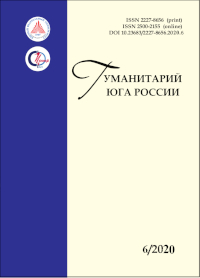Методологические параметры исследования профессионализации и депрофессионализации российской молодежи на рынке труда
Научная статья
Аннотация
Литература
Бродовская Е. В., Домбровская А. Ю., Пырма Р. В., Синяков А. В., Азаров А. А. Влияние ци¬фровых коммуникаций на формирование профессиональной культуры российской молодежи: результаты комплексного прикладного исследования // Мониторинг общественного мнения: экономические и социальные перемены. 2019. № 1. С. 228–251.
Вишневский Ю.Р., Нархов Д.Ю., Дидковская Я.В. Тренды высшего образования: профессионализация или депрофессионализация? // Образование и наука. 2018. Т. 20, № 1. С. 152–170.
Волков Ю. Г. Концептуальные основы исследования новых социальных лифтов в российских регионах // Гуманитарий Юга России. 2020. Т. 9, № 1. С. 67–82.
Гончарова Е. П. Интеллектуализация профессионального образования: от профессии к трансфессии. Режим доступа: https:// rep.bntu.by/bitstream/handle/data/69082/120-124.pdf?sequence=1&isAllowed=y.
Горшков М.К. Российская молодежь: к истории и роли в современном обществе // Гуманитарий Юга России. 2019. Т. 8, № 4. С. 16–25.
Дружилов С.А. Профессионально-деструктивная деятельность как проявление профессиональной маргинализации и депрофессионализации // Вестник Московского ун-та. Серия 14 : Психология. 2017. № 2. С. 45–63.
Зеер Э.Ф. Методология развития транспрофессионализма субъектов социономических профессий // Образовательные технологии. 2018. № 3. С. 46–59.
Зубок Ю.А., Чупров В.И. Современная социология молодежи: изменяющаяся реальность и новые теоретические подходы // Россия реформирующаяся : ежегодник / отв. ред. М.К. Горшков. М.: Новый хронограф, 2017. Вып. 15. С. 12–48.
Ильин В.И. Профессия как индивидуальная жизненная колея: концептуализация категории // Журнал исследований социальной политики. 2015. Т. 13, № 4. С. 515–528.
Кислов А.Г. От опережающего к транспрофессиональному образованию // Образование и наука. 2018. Т. 20, № 1. С. 54–74.
Клименко Л.В., Посухова О.Ю. Прекариатизация труда и протестные настроения социально ориентированных профессиональных групп в российском обществе // Власть. 2018. Т. 26, № 9. С. 134–141.
Мухина К.С. Депрофессионализация российской молодежи: институциональные факторы воспроизводства // Гуманитарий Юга России. 2017. № 6. С. 242–250.
Растегаева А.В. Депрофессионализация трудовых ресурсов в современной России // Вестник Поволжского института управления. 2017. Т. 17, № 3. С. 88–94.
Стофарандова В.В. Проблемы взаимодействия системы образования, рынка труда и предпочтений молодёжи в вопросах профессионального выбора (на примере г. Махачкалы) // РППЭ. 2018. № 9 (95). С. 146–154.
Транспрофессионализм субъектов социально-профессиональной деятельности / В.С. Третьякова [и др.]; под ред. Э.Ф. Зеера, В.С. Третьяковой. Екатеринбург: Изд-во Рос. гос. проф.-пед. ун-та, 2019. 142 с.
Устинова К.А. Сфера образования и рынок труда: проблемы рассогласования // Социологические исследования. 2014. № 6. С. 96–103.
Фадеева И.М. Профессионализация и депрофессионализация в современном российском обществе: взгляд социолога // Вестник Нижегородского ун-та им. Н.И. Лобачевского. Социальные науки. 2014. № 1 (33). С. 108–113.
Фоменко А.В., Такишина Е.А. Влияние системы профессиональной ориентации на эффективность использования трудовых ресурсов и производительность труда // Изв. Сарат. ун-та Нов. сер. Экономика. Управление. Право. 2019. № 1. С. 74–81.
Цвык В. А. Профессионализация как социальный процесс // Вестник РУДН. Социология. 2003. № 4. С. 258–269.
Яницкий О. Н. Возможно ли сегодня социальное прогнозирование динамики мобильного мира? // Вестник Института социологии. 2019. № 28. С. 11–28.
Sheller M., Urry J. The New Mobilities Paradigm // Environment and Planning A. 2006. No. 2 (38). P. 207–226.
Поступила: 17.09.2020
Опубликована: 23.12.2020






